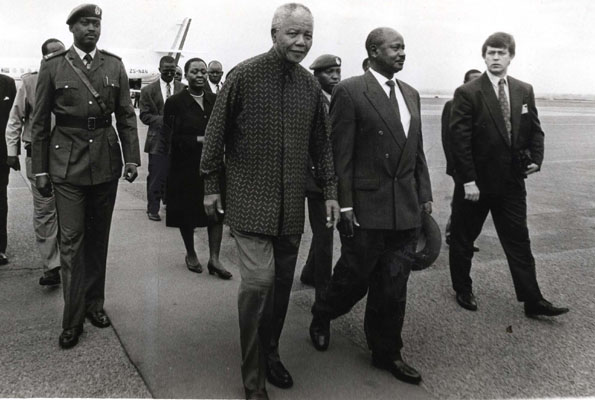When Nelson Mandela was still under incarceration and singing positively about him was literally criminal under Apartheid, in 1987, the South African legendary artiste Chicco Chimora sang a transparently-veiled, highly emotional song with the lyrics:
“We miss you Manelo, where are you?
Mama was crying the day you disappeared;
Papa was weeping when you ran away;
Come back home, we’re missing you…”
Of course, it is said that when he performed it at concerts, crowds insisted on singing we miss you Mandela in place of the Manelo guise.
Similarly, Lucky Dube hid behind metaphor in songs like Slave (1989) where he sings:
Ministers of religion
Have visited me many times
To talk about it
They say to me
I gotta leave it …
It’s a bad habit for a man
But when I try to leave it
My friends keep telling me
I’m a fool amongst foolsNow I’m a slave, a slave… I’m a liquor slave.
You just have to replace the word Liquor with Power to dig out the message depicting the situation of the Apartheid regime that had become enslaved by its own misdeeds and no longer sure who to listen to between its sycophants and those who wanted to save it from itself.
Listening to these songs a few weeks ago, I was sent into helpless nostalgia. Not about the songs and their context, but about President Museveni from my childhood memories.
I loved drawing right from primary school, and I remember being punished a couple of times for being found drawing during class time. I still keep some of these books, and I look at the many drawings in imagination and reminiscence of what could have been going on in my young mind.
Most of the drawings were of President Museveni, Salim Saleh, Philly Lutaaya, and some dancer called John Jones. The drawings of Museveni clearly depict the fantasy and admiration I had for him as a child. This wasn’t only because he was the president; he was uncontestably an enigma across the social and political spectrum.
Yes, we had heard about all the myths surrounding his bush war escapades and mysteriousness. Who had not heard about how he would turn into a cat and disappear when Tito Okello’s soldiers surrounded him? Talk about his bank robberies was everywhere, but in a heroic interpretation.
Many of the things we had watched in Hollywood movies were partly brought close to us in bush war narratives, mainly as told and embellished by the victors.
But even beyond the narratives, I don’t think there is any president in Uganda’s history that has achieved as much popularity as Museveni did at the time.
In our child games, how we euphorically sang those charismatic war songs! Eeh moto unawaka maama eeeh moto unawaka… Amba Museveni ambaaa, kulika entalo, ambaaa… We felt the man, we felt the liberation.
We received free high-quality 96-page exercise books labelled Government of Uganda, Not for Sale – even in private schools.
If it wasn’t for the exclusionary post-war ‘anyanya’ narrative that demonised people from Northern Uganda, I think Museveni would have scored about 90 percent had there been an election in the late 1980s. When he spoke, even for a child, you wanted to listen on and on.
The sagacity in his oratory deployment of local proverbs was always a thing to look forward to in his speeches. And all was easily taken in because he not only spoke, he lived his word – no lies, no summersaulting.
So, it was hard to doubt him without seeming odd. Like is said of good wine, his name needed no bush.
I remember in P6 we had an inter-school art exhibition, and one of our teachers, Master Budde, drew an awesome portrait of Museveni waving a salute. It stole the whole show.
One simply had to look in Museveni’s eyes to see a bright future for the country. Or was I just a naïve child?
When Nelson Mandela visited Uganda in the 1990s, we lined the roads in chants as they [Mandela and Museveni] waved at us through the roof of an SUV.
We had waited for about five hours in our school uniforms without anything to eat. But the hunger meant nothing at that special moment. It was my first time to see my hero, Museveni, alongside another African legend. That picture is still fresh in my mind.
Well, I will skip all else we know too well that happened in subsequent years of liquor. The next time I came closest to him again was coincidentally at the launch of the Nelson Mandela Lecture Series at Makerere University a few weeks ago.
He was seated in my eyes’ direction. I looked at him for hours and somehow found a tear rolling down my face. This was not helped by his long, patronising speech and saying that he finds no problem with overstaying in power!
That now we have to sing the moto unawaka songs in resistance of the same man that was our hero is quite painful. It’s more disturbing that he no longer seems to care what we feel about him. This can’t be him!
When we travel outside Africa and say we are from Uganda, we had gotten used to being asked about Amin. But that we are now asked about Museveni in almost the same mockery is ironical.
We miss you Museveni; where did you go? Please come back and talk to this one in your body to honourably leave before all your legacy is irreparably reversed. I pray the sycophants that surrounded him when you left will allow you to access him.
They have no reputation to lose and would even exchange their name for good food, but you still do. Come back home and quit the liquor.
This post originaally appeared in the The Observer






